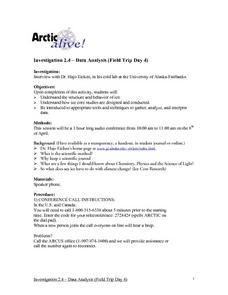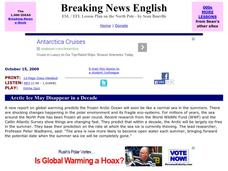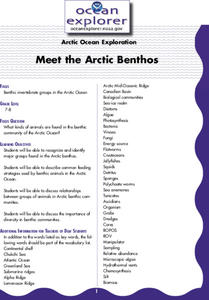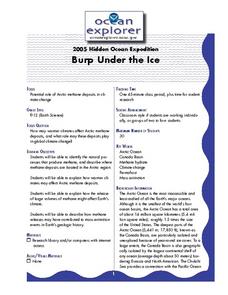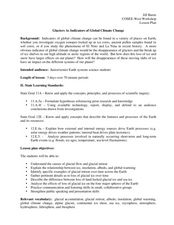Curated OER
Biomes: Land of the Inuit
Learners study Inuit and their ancestors. For this biomes lesson students study the relationship between the Inuit and their environment and create a class art gallery.
Polar Trec
Bioaccumulation of Toxins
In 2015, Peter Cook found that sea lions with high levels of exposure to toxins suffered permanent brain damage if they survived at all. Scholars learn about the accumulation of toxins at various levels of the food chain. Using...
Curated OER
Antarctic Meltdown?
In this geography worksheet, students read an excerpt about how scientist are examining changes in the Arctic and Antarctic ice caps. They use the information in the excerpt and any other references listed to answer the three questions...
Curated OER
Jeannette
Middle schoolers develop hypothesis about what might happen when salt water is frozen. In groups, they freeze ice samples with different salt concentrations. They use the internet to research the situation of the Jeannette to discover...
Global Oneness Project
Witnessing Icebergs
Camille Seaman's photoessay, "Witnessing Icebergs" documents just a tip of the problem of climate change through images of icebergs in both the Arctic and Antarctic polar regions. After viewing the haunting images, viewers respond to a...
Curated OER
Breaking News English: Arctic Ice May Disappear in a Decade
In this English worksheet, students read " Arctic Ice May Disappear in a Decade," and then respond to 1 essay, 47 fill in the blank, 7 short answer, 20 matching, and 10 true or false questions about the selection.
Curated OER
Meet the Arctic Benthos
Learners recognize and identify major groups found in the Arctic benthos. They describe common feeding strategies used by benthic animals in the Arctic Ocean. They discuss relationships between
Curated OER
Getting to the Bottom
Pupils identify taxa in Arctic benthic communities. They discover organisms that live in these Arctic areas. They analyze data compiled for the Canada Basin Benthic Samples, 2002.
Curated OER
The Energy Debate - Sea Level Rise
Students comprehend the impact of global warming on our coastal cities. They appreciate how geographic information systems can be used to represent scientific data. Students research the melting of the ice caps in Antarctica and the Arctic.
Curated OER
Burp Under the Ice
Students examine the impact of climate warming on Arctic methane deposits. They identify natural methane processes and describe how this contributes to species extinction. They write reports on their findings.
Curated OER
Breaking the Ice: Who Controls the Northwest Passage?
Students consider the global climate issue. In this Northwest Passage lesson, students examine who has sovereignty of the passage and discuss the importance of the Law of the Seas and its impact on the global climate issue. Students...
Curated OER
Bearly Any Ice
Students participate in a prey-predator game. After reading background information, they discover the impact from the changes global warming presents to the polar bears and ringed seals. They role play the role of either the seal or...
Curated OER
Where Have All the Glaciers Gone?
Pupils examine how climate change is affecting sea ice, vegetation and glaciers in the Arctic region.
Curated OER
Reflecting on Reflectivity
Students plan and construct a "mini-lab" to measure the reflectivity of different earth surfaces. They measure reflectivity of materials, including ice, soil, rocks, etc., and then extrapolate from what they have learned to consider the...
Polar Trec
Why Can’t I Eat This Fish?
Can turning on the television lead to toxins in the food supply? The lesson offers an opportunity for young scientists to complete guided research. A worksheet lists each question as well as the web page necessary to answer the question....
Curated OER
Blue Planet: Frozen Seas
Students study the animals from the Arctic and how they have adapted. In this ocean lesson students create a poster about their given animal and present it to the class.
Curated OER
Glaciers As Indicators of Global Climate Change
Students research about glacial ice melting on the four major spheres of the Earth. In this earth science instructional activity, students explain how this process relates to global warming. They create a presentation and share their...
Curated OER
2005 Hidden Ocean Expedition What's Eating You?
Analyze data and make inferences about the trophic position of organisms in the Canada marine food web. After a review of the geography and formula, discuss results and write an essay to improve the understanding of Artic food webs.
Curated OER
Jelly Critters
Students compare and contrast three different organisms that are considered gelatinous zooplankton. They describe how they fit into marine food webs.
Curated OER
Help Save the Polar Bear
Students use ice cubes to demonstrate how the polar ice caps are melting and how it effects the polar bears. In this polar bear lesson plan, the teacher explains how polar bears live on the north pole and how they are having trouble due...
Information is Beautiful
How Many Gigatons of Carbon Dioxide...?
Here is an interesting infographic that presents information on the amount of carbon dioxide we can safely release into the atmosphere compared to the actual amount we have released to date.
Curated OER
Albedo Transect Research (Field Trip Day 1)
Students explore how Albedo research is designed and conducted by interviewing the researchers at one of their research sites. They relate Albedo and it's relationship to the Arctic environment as well as assess how a small change in a...
NASA
Global Air Temperatures Graph: Student Activity
Analyze years of hard climate change evidence in minutes. Climatologists evaluate graphical data about climate change by answering questions. Scientists work collaboratively using a literacy cube or virtual die that directs them through...





